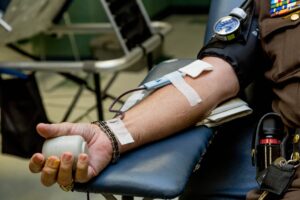Discrimination in the blood supply
In 1983, during the onset of the AIDS crisis, the Federal Drug Administration put a lifetime ban on men who had sex with men (MSM) – even one time since 1977 – from donating blood. The reason for this was due to “an increased risk of transfusion transmissible infections” related to the AIDS crisis.
On Dec. 21, 2015, the FDA announced that it would be overturning the lifetime blood ban in exchange for a policy that donations could be made by MSM after they had been sexually abstinent for 365 days. This ruling also applied two women who had sex with a man who had sex with a man.
Early this month, however, the FDA announced that it would be revising the guidelines for blood donation to help mitigate the effects of low-turnout at blood drives during the COVID-19 pandemic.
The FDA reports on its website that “current policies regarding certain donor eligibility criteria can be modified without compromising the safety of the blood supply.” The new guidelines dictate that blood donations are banned for the same groups of people, only now based on a 90-day period of abstinence.

While the safety and integrity of the national blood supply is not something to jeopardize, especially in a time of national and international crisis, it is also important that the government allow citizens to participate in those programs without facing discrimination.
The problem with the current FDA guidelines is that they assume that every person of a certain identity is making unsafe and risky choices, and they do not screen for the specific risk behaviors that lead to transfusion transmissible diseases.
When pre-screening blood donors, the emphasis should not be placed on the labels of “man who had sex with a man” or “woman who has had sex with a man who has had sex with a man,” but on whether someone has had unprotected sex – regardless of sex or gender – with someone whose HIV status was unknown to them.
The Human Rights Campaign made a public statement that provided a concise example of the flaws in the current pre-screening procedures, even when enforced at a three-month versus a one-year timeframe.
“For example, a man who has had protected oral sex with another man once in the past year is currently barred from donating blood. Yet a woman who has had unprotected sex with multiple partners over the same time frame with no knowledge of their personal histories remains in the donor pool,” the HRC wrote.
As doctors and scientists around the globe are seeking plasma donations from people who have recovered from COVID-19 in order to get a better understanding of potential antibody immunity, it is more important than ever to allow any and all low-risk individuals to donate plasma.
Time after time, when there have been emergencies that call on blood donations, members of the lgbtq+ community have voiced the emotional pain that it causes to not be able to donate. The stigma against HIV/AIDS in the United States was perpetuated by the Reagan administration and has caused lasting damage.
Not accounting for the countless queer people who died due to government inaction, there is a remaining stigma that queer people are “dirty” or “carry disease.” It is time to end these discriminatory policies and adopt a screening system based on risk behaviors that allows for queer people to support their communities.


